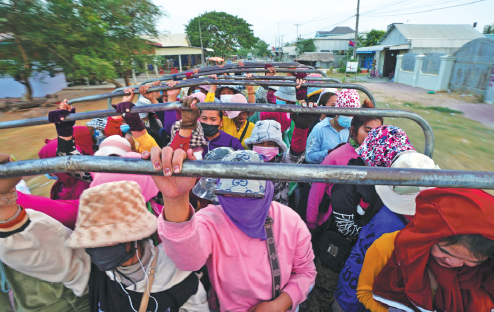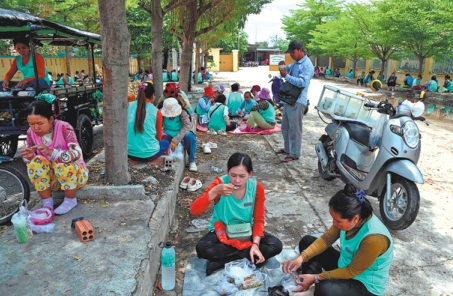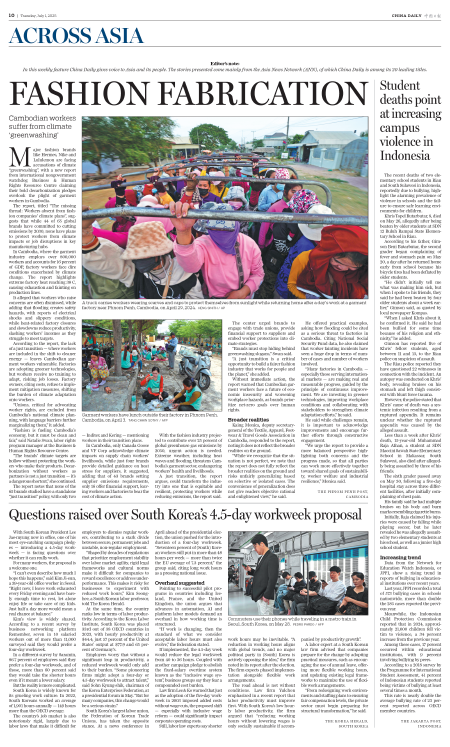
A truck carries workers wearing scarves and caps to protect themselves from sunlight while returning home after a day's work at a garment factory near Phnom Penh, Cambodia, on April 29, 2024.

Garment workers have lunch outside their factory in Phnom Penh, Cambodia, on April 3.
Editor's note: In this weekly feature China Daily gives voice to Asia and its people. The stories presented come mainly from the Asia News Network (ANN), of which China Daily is among its 20 leading titles.
Major fashion brands like Hermes, Nike and Lululemon are facing accusations of climate "greenwashing", with a new report from international nongovernment watchdog Business & Human Rights Resource Centre claiming their bold decarbonization pledges overlook the plight of garment workers in Cambodia.
The report, titled "The missing thread: Workers absent from fashion companies' climate plans", suggests that while 44 of 65 global brands have committed to cutting emissions by 2030, none have plans to protect workers from climate impacts or job disruptions in key manufacturing hubs.
In Cambodia, where the garment industry employs over 800,000 workers and accounts for 16 percent of GDP, factory workers face dire conditions exacerbated by climate change. The report highlights extreme factory heat reaching 39 C, causing exhaustion and fainting on production lines.
It alleged that workers who raise concerns are often dismissed, while adding that flooding creates safety hazards, with reports of electrical shocks and slippery conditions, while heat-related factory closures and slowdowns reduce productivity, slashing workers' incomes as they struggle to meet targets.
According to the report, the lack of a just transition — where workers are included in the shift to cleaner energy — leaves Cambodian garment workers vulnerable. Factories are adopting greener technologies, but workers receive no training to adapt, risking job losses. Factory owners, citing costs, refuse to implement mitigation measures, shifting the burden of climate adaptation onto workers.
"Unions, critical for advocating worker rights, are excluded from Cambodia's national climate planning, with language barriers further marginalizing them," it added.
"Fashion is fueling Cambodia's economy, but it must be clean and fair," said Natalie Swan, labor rights program manager at the Business & Human Rights Resource Centre.
"The brands' climate targets are hollow without protecting the workers who make their products. Decarbonization without workers as partners is not a just transition — it's a dangerous shortcut," she continued.
The report notes that none of the 65 brands studied have a standalone "just transition" policy, with only two — Inditex and Kering — mentioning workers in their transition plans.
In Cambodia, only Canada Goose and VF Corp acknowledge climate impacts on supply chain workers' livelihoods, while just four brands provide detailed guidance on heat stress for suppliers, it suggested, adding that of 43 brands setting supplier emissions requirements, only 16 offer financial support, leaving workers and factories to bear the cost of climate action.
With the fashion industry projected to contribute over 25 percent of global greenhouse gas emissions by 2050, urgent action is needed. Extreme weather, including heat waves and flooding, threatens Cambodia's garment sector, endangering workers' health and livelihoods.
A just transition, the report argues, could transform the industry into one that is equitable and resilient, protecting workers while reducing emissions, the report said.
The center urged brands to engage with trade unions, provide financial support to suppliers and embed worker protections into climate strategies.
"Brands must stop hiding behind greenwashing slogans," Swan said.
"A just transition is a critical opportunity to build a fairer fashion industry that works for people and the planet," she added.
Without immediate action, the report warned that Cambodian garment workers face a future of economic insecurity and worsening workplace hazards, as brands prioritize net-zero goals over human rights.
Broader realities
Kaing Monica, deputy secretary-general of the Textile, Apparel, Footwear& Travel Goods Association in Cambodia, responded to the report, noting it does not reflect the broader realities on the ground.
"While we recognize that the situation is not perfect, we note that the report does not fully reflect the broader realities on the ground and risks unfairly generalizing based on selective or isolated cases. The convenience of generalization does not give readers objective rational and enlightened view," he said.
He offered practical examples, asking how flooding could be cited as a serious threat to factories in Cambodia. Citing National Social Security Fund data, he also claimed that worker fainting incidents have seen a huge drop in terms of number of cases and number of workers involved.
"Many factories in Cambodia — especially those serving international markets — are making real and measurable progress, guided by the principle of continuous improvement. We are investing in greener technologies, improving workplace conditions and collaborating with stakeholders to strengthen climate adaptation efforts," he said.
He said while challenges remain, it is important to acknowledge improvements and encourage further efforts through constructive engagement.
"We urge the report to provide a more balanced perspective highlighting both concerns and the progress made, so that all parties can work more effectively together toward shared goals of sustainability, worker welfare and industrial resilience," Monica said.

